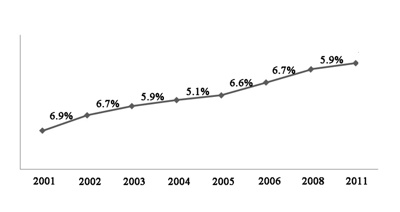
The Ewha Tuition Review Committee (TRC) held its first meeting on Jan. 14, with the last meeting on Jan. 23, deciding to decrease tuition by 1.5 percent in 2013. Although the school presented a promising result, the 45th Student Government Association (SGA), Woori Ewha, announced there had been some conflicts in the process of coming to an agreement. However, such confrontations are not only an issue of Ewha, but also that of other schools.
The TRC first appeared as a partial solution to the financial hardships students face owing to the pressure of high tuition fees. According to the statistics collected by the Korean Educational Development Institute, universities in Korea have increased their tuition up to 9 percent over the last decade.
The Ewha TRC had been established in 2011, but this year was the first time it was held with student representatives.
“Before the TRC meetings were held, the school claimed the former SGA’s activities in demanding tuition reduction did not seem valid,” said Bong Woo-ri (Dance, 4), the president of the SGA. “Thus, it was necessary to participate to provide valid evidence in requiring the decrease.”
The conflict arose when the school did not provide the student members with sufficient information regarding tuition.
“At the second TRC meeting, the school had not prepared the data we had asked for in the first meeting,” Bong said. “Although the school agreed to provide data after the second meeting, we were only provided with a general outline of the provisional budget and had to analyze the information in a fixed, limited time the school presented.”
However, the school does not agree.
“Although there was a delay in providing the requested data, we eventually allowed access to the students,” an Ewha official said.
The school claims that it had put in much effort to alleviate the financial burden of parents and students.
“For five years, Ewha has frozen or decreased tuition despite the uneasy financial conditions,” the official said. “However, we assure students that we will not cut back research expenses but will continue to enlarge scholarships as well as improve the education atmosphere. We plan to discuss and communicate actively with students of the crucial matters later on.”
Ewha is not the first to report such conflicts between the school and the student members of the TRC. Dongduk Women’s University and Korea University have also upset the student members during the TRC meetings.
“The main cause of the conflicts is in the different views on how things are to be handled,” said Choi Kyeong-eun (Dongduk Women’s University, 4), the president of Dongduk Women’s University Student Union. “Without any discussion or proper notice, the school abruptly gave us a date for when the TRC meetings were to be held. Moreover, we were not given information like the provisional budge for 2013 or the closing account of 2012 beforehand.”
The conflict reached its peak in Korea University as its TRC meeting collapsed. On the last day of the meeting, the school proposed to lower tuition by 1 percent, whereas the students requested a higher percentage of decrease for each independent college. The negotiation broke off as students walked out without signing the agreement. Nonetheless, Korea University allocated its tuition notice with the application of lowering the tuition fee by 1 percent.
“The committee meetings had to be adjourned before February as there was a specific time period for the tuition notice to be announced,” said Lee Jang-wook, Manager of the Academic Affairs Department in Korea University. “The student members acknowledged the school’s efforts in lowering tuition, but did not sign as they believed such a small decrease would not be effective in persuading the Central Operation Committee.”
However, Korea University students argued that the school’s attitude in the TRC meetings were not that of an educational institution trying to lower tuition but a judicial foundation seeking profit.
“The school had formerly prepared a provisional budget with an increase of 4 percent compared to last year’s tuition,” said Hwang Soon-young (Korea University, 2), the president of Korea University’s Student Union. “Furthermore, the student representatives were not treated as equal negotiators as school officials constantly pointed out flaws not in how we analyzed the budget, but in our manners. We believe 1 percent is a meager decrease and will continue to demand a lower tuition.”
The Ministry of Education, Science and Technology (MEST) comments both sides of the party need to conform to the rules of the Higher Education Act.
“Students should acknowledge that the school will provide data that they have been requested under the circumstances in which by revealing, it does not violate privacy or official regulations,” said Kim Chang-gil, the Assistant Director of Scholarship Student Aid Division in the MEST. “On the contrary, the schools should be more open to students, especially on their accounting data, for the TRC to become more effective.”

